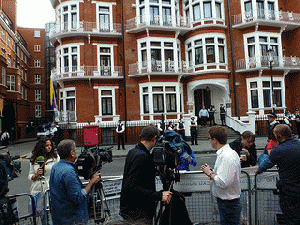Reprinted from shadowproof.com
Attorneys for WikiLeaks editor-in-chief Julian Assange and other staff members of the media organization have condemned the United Kingdom's diplomatic protest against Ecuador for continuing to provide Assange asylum.
"We are deeply troubled by the reported diplomatic protest made by the United Kingdom against Ecuador for granting asylum to Assange and by the continued menacing police presence outside the Embassy of Ecuador in London," lawyers from the Center for Constitutional Rights (CCR) declared.
The UK, according to CCR, has "previously threatened to storm the Ecuadorean Embassy and arrest Assange, in clear violation of the Vienna Convention's protection of the inviolability of sovereign embassy properties."
Attorneys described asylum as a "humanitarian act," which the United Nations General Assembly has "unanimously declared" as an act other countries should never construe as unfriendly. Yet, the U.S., U.K., and Sweden have protested and threatened diplomatic consequences against Ecuador.
"We call on the British government to explicitly and immediately confirm that it will honor its international and diplomatic commitments," CCR demanded.
Hugo Swire, British Foreign and Commonwealth Office Minister of State, stated on August 13, "Ecuador must recognize that its decision to harbor Mr. Assange more than three years ago has prevented the proper course of justice."
The statement came after Sweden dropped multiple claims against Assange, which stem from sexual misconduct allegations. In spite of the fact that Swedish prosecutors remain committed to investigating a rape allegation, Swire blamed Ecuador for allowing the claims to expire.
"It is completely unacceptable that the British taxpayer has had to foot the bill for this abuse of diplomatic relations," Swire said, citing the millions of Euros spent on a police presence outside the Ecuadorean embassy.
Swire threatened, "I want to make clear that as an allegation of rape remains outstanding, the UK continues to have a legal obligation to extradite Mr Assange to Sweden. I have instructed our Ambassador in Quito to reiterate to Ecuador that the continuing failure to expedite the Swedish Prosecutor's interview, and to bring this situation to an end, is being seen as a growing stain on the country's reputation. I will also repeat this to the Ecuadorean Ambassador in London."
The acting foreign minister for Ecuador, Xavier Lasso, responded that it was unacceptable to "place the responsibility for the lack of progress in this area over the last five years on Ecuador."
According to The Guardian, Lasso condemned the British government for deploying police against the Ecuadorean embassy in an "invasive and unnecessary" manner. He noted the U.K. had threatened to "violate the immunity of diplomatic premises."
"The republic of Ecuador will not take lessons from any foreign government, least of all those that are unaware of the institution of political asylum, its legitimacy, attached and enshrined in international law, and its humanitarian nature based on the sovereign equality of nations."
Carey Shenkman, a human rights attorney representing Assange, said on the August 24 episode of "Law & Disorder Radio":
Asylum is an institution that's as old as civilization itself, and one of the rules is that you don't retaliate against other countries for granting it. So, if the United States decides to grant asylum to a Chinese businessman accused of corruption in China, China can't say levy economic sanctions against the U.S.
(Note: You can view every article as one long page if you sign up as an Advocate Member, or higher).






